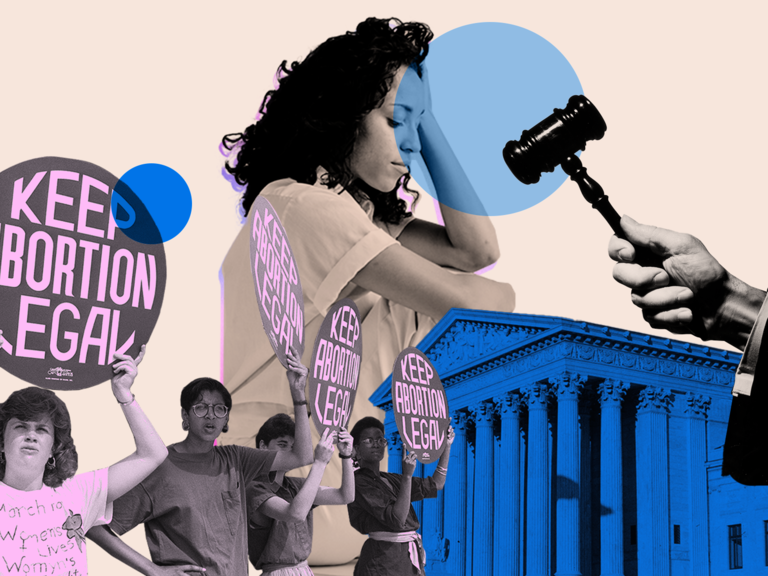What's at Risk for Couples Now That Roe v. Wade is Overturned? Here's What We've Seen Since 2022

For half a century, Roe v. Wade granted women the constitutional right to terminate a pregnancy before fetal viability (usually around 23-24 weeks), meaning states couldn't pass laws banning abortion before that stage in the pregnancy. In June 2022, however, that very right was revoked for some, resulting in broader implications for those couples. In fact, the financial, relationship and mental well-being of some partners were likely called into question after the Roe v. Wade ruling was overturned.
Prior to the decision, we connected with family law experts to weigh in while exploring the correlation between abortion denials and the unequivocal impact on women and couples. "There are [plenty] of tough discussions couples should have prior to marriage and even after marriage, and those conversations–now more than ever–should include family planning at every stage of procreation," Natalia Wilson, managing partner of Ain & Bank, said at the time. "Finances and healthcare may become a larger issue for couples as pro-choice states could [potentially balloon] in size with people seeking more reproductive healthcare rights. This could either provide financial resources for healthcare providers or possibly overwhelm the system."
"The success or failure of any relationship oftentimes depends on the balance of power and the extent to which the dominant partner chooses to exercise his or her power. Historically, power has derived from wealth, race, gender, social status, education and intellect, and the extent to which either partner has been led to believe that he or she is superior to others, or worthy of respect, because of any or all of the [aforementioned factors]," said Caroline Krauss, founding partner of Krauss Shaknes Tallentire & Messeri LLP. "If we're coming from a perspective that an equal or equitable balance of power creates and fosters a healthy relationship, then denying women meaningful access to safe and affordable abortions and reproductive care will necessarily and adversely impact relationship wellness."
In This Article:
- What's Happening with Roe v. Wade?
- How Overturning Roe v. Wade Impacts Couples
- What Else is at Risk for Couples
- What Can You Do About All This?
What's Happening with Roe v. Wade?
In June 2022, Roe v. Wade was overturned, prompting sweeping concerns over a woman's right to choose and her autonomy over her own body. What this meant was that there was no longer a constitutional right to abortion prior to fetal viability. Eventually and since the ruling was overturned, US residents saw that restrictions have varied by state. What was a general right for women since the 1973 ruling resulted in drastic changes across certain states (at least a dozen as of September 2024). Some states have introduced trigger bans, which can outlaw abortions in situations where a preceding event takes place. Others have criminalized it, outright, including Texas. All of this has resulted in questions about the continued ripple effects of a post-Roe world. Broadly, many couples and families have shared cause for concern, and experts explain why.
How Overturning Roe v. Wade Impacts Couples
Family planning and reproductive rights are among the highly contentious and questioned issues ahead of the 2024 election. While the pro-choice, pro-life movement has long created a divide along voter lines, the concern crystallized and became one that was urgent when Roe v. Wade was overturned. Issues today include a woman's right to choose, access to organizations like Planned Parenthood, steps to surrogacy, along with a focus on biological vs. adoptive parenting.
Overturning Roe v. Wade has resulted in certain state restrictions on other reproductive health decisions, thereby affecting relationships and households under those umbrellas. In fact, some couples have even made decisions to leave certain states due to the prohibitive nature of restrictions around local abortion laws. There have also been cases where maternal deaths have been related to abortion bans.
Medical Decision Consent May Be Required From Partners
Previously, Roe v. Wade allowed for a woman to make the decision over her own body of whether to terminate a pregnancy before fetal viability. The role of your partner now varies by state law, but some states now require partner consent to terminate a pregnancy. In situations of trauma and abuse, this could be especially repugnant for the party that lacks the power to make decisions for themselves.
Further Imbalances of Equality in the Household Are Likely
A point that social scientists are researching is the equality of chores and tasks shared between partners in each household. "A couple's relationship wellness also impacts their children and other relationships. It trickles down in ways too numerous to count," says Krauss, who points to the household responsibilities that often fall to women in some relationships. "Adding more and unwelcome children only adds to that load, which oftentimes leads to resentment and break-ups."
The Turnaway Study (commissioned by ANSIRH - Advancing New Standards in Reproductive Health) found women denied abortions were more inclined to raise children by themselves compared to recipients of an abortion. The women who were denied abortions and gave birth were also more likely to face physical violence from the man who was involved in the pregnancy.
The Well-Being of Women and Families Could Be Influenced
In the same study, women denied an abortion were more likely to lack the general resources to cover basic living expenses (housing, food and transportation). Directly correlated for these women was a decline in their credit scores, in addition to surmounting debt. (The study found debt increased for women by 78% post-delivery.) In turn, abortion denials were likely to create a vulnerability gap where the desolate consequences of evictions and bankruptcies were a step closer.
"There are studies that suggest women denied an abortion suffer worse mental health and financial outcomes than those who are able to receive one," said Wilson. "With this anticipated Supreme Court opinion, in addition to the potentially drastic tax on women, there will likely be a disproportionate impact on women and families of color."
"As women become more financially secure and less dependent on a partner, they are able to more easily free themselves from dominant partners, including abusive partners," said Krauss. "The right for a woman to be able to choose whether or not to continue a pregnancy or terminate it is fundamental to the balance of power in a relationship and in our society."
Career Growth and Earning Power for Couples Can Decline
Another factor couples should consider is their future goals within the workplace. "Opportunity has been far easier to grasp if you are a non-Hispanic white man–without the burden of a family–than it is if you are a Black woman with two children at home to raise," Krauss elaborated. "The former has the ability to work harder toward attaining higher education and to burn the midnight oil at the office or at a destination conference where other educated, hard-working titans of business have convened."
Coupled often with career growth are financial goals. A post-Roe society, though not just related to the ruling, has prompted even more discussions around the allocation of financial resources (investing, saving for retirement, paying down debt).
Maternal Health Protections Could Diminish
In some cases, medical termination of pregnancy could help couples to avoid medical risks, impacting possibly both physical and mental health. If Roe is overturned, some states could restrict the ability to terminate a pregnancy even when necessary to protect maternal health. This would put couples in the terrible position of having a pregnancy pose a substantial risk to their beloved partners.
The Turnaway Study found that women denied an abortion and gave birth were likely to face an increased number of life-threatening complications, including eclampsia and postpartum hemorrhage.
Family Planning Discussions Will Transform
For couples who rely on birth control and other contraceptives to work through a timeline in their relationship, much is at stake, including—at its core—couples' access to contraception and the potential volume of intimacy within that relationship. If Roe is overturned, it could signal a trend to restricting other forms of reproductive health measures in some states.
"The entire landscape on how parties evaluate family planning will change," says Wilson. "The options you once had when weighing what to do in the event of an unwanted pregnancy or unexpected pregnancy will change. Couples may no longer have the options they have today, especially if your state makes a change to forbid abortion within its territory. The conversations couples will have will undoubtedly be different going forward and there may be geographical restructurings, such as a mass relocation by certain groups, and intriguing custodial considerations."
Residential Decisions Could Be Impacted
If abortions are outlawed in a state, couples may have to travel to another state to obtain a lawful abortion. There are fears other states could impose residency restrictions on getting an abortion, which would further restrict access for couples located in a state where abortion is illegal. "Ask: would [your partner] be willing to move to another state now to ensure they could exercise future rights if they needed to make a decision to abort a pregnancy?" advised Wilson.
What Else is at Risk for Couples in the Future?
As it stands, the current ideological makeup of the Supreme Court has impacted couples. In addition to Roe v. Wade being overturned, there are some additional rulings that have negatively impacted the wellbeing of couples. Read what else has occurred in a post-Roe world below.
LGBTQIA+ Marriage
Following the Supreme Court's decision to overturn Roe v. Wade, the U.S. House of Representatives rapidly introduced RFMA (the Respect for Marriage Act). The bill was signed into law in December of 2022 by President Joe Biden to statutorily protect couples' rights, particularly those in same-sex and interracial marriages.
While the law was received warmly by its supporters, many LGBTQIA+ couples have expressed their concerns about the legal landscape. For many of these couples, the legal landscape and protection of their rights, including reproductive rights, remains at risk. As it stands, however: One of the highest-profile legal cases related to marriage in the 21st century was Obergefell v. Hodges, a landmark ruling made in 2015 by the Supreme Court of the United States.
Concerns about Discrimination in the Wedding Business
In June 2023, a year after Roe v. Wade was overturned, SCOTUS made yet another decision that created issues for LGBTQ+ couples, particularly. In 303 Creative, the court sided with a Colorado-based website designer, agreeing that she had the right to refuse work for same-sex couples. The case opened up concerns about wedding vendors' willingness to work with couples of all backgrounds and sexual orientations during a time period when they should feel most joyful. This is still an ongoing concern for couples.
Concerns about Immigration Status
A trend toward more government restrictions on marriage could also impact couples in the area of immigration status. As we've seen over the last five to 10 years, the changes in viewpoint have been startling.
In addition, the immigration process has never been an easy one for those who want to live in the US. Simply put: if you're having an issue or concern about getting married to a person, whom you love, who is not a US citizen, then you must pay attention. "You should be concerned about the legislature and the laws that are getting created around immigration at the national level. It's not about the president or the Supreme Court as much as it is about the individual legislature," explained Davis. "Voting and putting your energy behind a lawmaker who aligns with your set of beliefs about immigration is really what you should be doing right now."
What Can You Do About All This?
Finally, if you or your partner is impacted by any of these issues or Roe v. Wade being overturned, we encourage you to have those important life discussions now, especially as you're wedding planning.
Additionally, there is something else you can do that is immediate: To exercise the right to vote if you are a US citizen over the age of 18. As 2024 is another presidential election year in the US, these are some of the issues that are considered tantamount to citizens. Every individual who has the right to vote in the US (and don't forget name changes too) has the opportunity to weigh in on these issues and others by exercising their democratic right and casting a ballot come November 2024.
About the Experts: Attorney Natalia Wilson is the managing partner of Ain & Bank based in Washington, DC. Caroline Krauss is the founding partner at matrimonial law boutique Krauss Shaknes Tallentire & Messeri LLP, based in New York.
Please Note: This article is for informational purposes only, and is not intended to provide legal or medical advice. Please consult with your legal counsel or licensed healthcare provider regarding your personal circumstances. The information discussed herein continues to evolve and The Knot undertales no obligation to update this information. Please refer to your state or local government's resources for the most up-to-date information on reproductive health regulations in your location.























